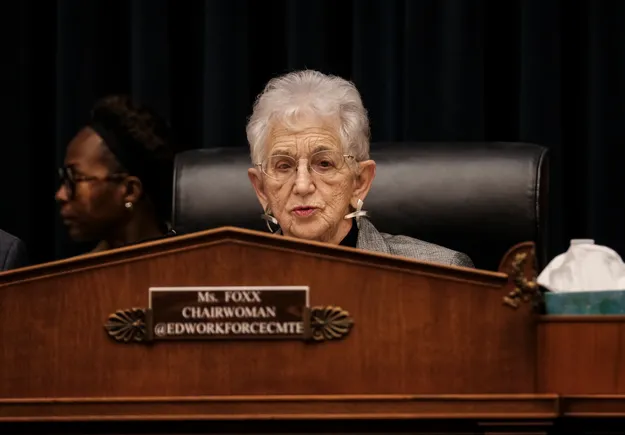The State University of New York at Potsdam is looking to eliminate 14 academic programs over the next few years — including bachelor’s in chemistry, public health and theater — as it tries to bridge a $9 million budget gap.
SUNY Potsdam President Suzanne Smith unveiled the cuts in a speech Tuesday, at one point growing teary-eyed as she detailed how the public institution will attempt to recalibrate its academic array in the wake of sliding enrollment and subsequent financial deficits.
The university will need to significantly reduce faculty numbers, Smith said during her remarks, although she did not offer the exact number of positions it will seek to cut.
Regardless, the process will be painful, but will enable SUNY Potsdam to lean into its strengths as a regional public college, Smith said.
These cutbacks come as the higher education landscape remains as harsh and competitive as ever, pressuring institutions of all types. While college closures this year have been at private institutions, publics have not been immune to financial stressors.
Even West Virginia University, a public flagship, has started phasing out degrees — more than two dozen — in the face of its own $45 million budget deficit, though faculty critics fault management for the financial hole.
The WVU cuts have majorly frayed the professor and administration relationship, and something similar could play out at SUNY Potsdam, with the union representing faculty already pushing back on leaders’ austerity plan.
SUNY Potsdam’s problems
The university is part of the State University of New York, the largest comprehensive public system in the country, enrolling about 364,000 students. But despite the system’s prominence, its enrollment — and SUNY Potsdam’s — has plummeted.
SUNY Potsdam at its peak had more than 4,400 students in fall 2012, which fell to about 2,500 now, according to institution data. University officials have blamed the decline on inhospitable demographics — essentially, there are fewer high school graduates to attend college.
“The pool we have to pull from is going to continue to shrink, probably at least for the next decade,” Smith, the university’s president, said during a press conference Tuesday.
As enrollment slipped, SUNY Potsdam tried to scale back. Administrators said Tuesday they brought down spending by almost $12 million over the last decade, almost entirely through employee attrition.
The university had 791 full-time equivalent employees in 2012-13, which fell to 609 FTE faculty and staff in 2022-23.
It also started phasing out four academic programs earlier this year, including bachelor’s degrees in computer science education and geographic information science. Now, it offers 46 undergraduate degrees, 15 graduate degree programs and 2 advanced certificates.
What’s on the chopping block?
None of this was enough to remedy the university’s financial straits, and it’s now mulling more drastic academic reductions. Rumors have already been swirling: The university’s faculty senate chair, Greg Gardner, told colleagues in a letter earlier this year to brace for “program and headcount cuts of an order beyond anything we have seen on the campus in living memory.”
Over the next three to four years, SUNY Potsdam wants to weed out a dozen bachelor’s programs and two master’s degrees in music performance and public health.
Officials said these are low-enrollment programs — students in them represent about 6% of the university’s population.
Students in the programs will “receive support to complete their degree here, enroll in a different major or transfer elsewhere, based on their personal circumstances and desires,” a document summarizing the plan states.
SUNY Potsdam so far won’t disclose the number of faculty who could be laid off. Smith said the administration is waiting, for instance, to see how many faculty members accept buyouts, which are being funded by the Potsdam College Foundation, its endowment manager.
Not every faculty member in the disciplines facing cuts may necessarily lose their jobs, either.
“Just because we’re discontinuing a program doesn’t mean we’re discontinuing the courses in that field,” Alan Hersker, SUNY Potsdam’s interim provost, said during Tuesday’s press conference.
Starting later this month, university officials will give faculty representatives two weeks to submit feedback on the academic cuts. Administrators then plan to send proposed cuts to SUNY system officials for approval toward the end of October.
SUNY Potsdam’s administrative wing is also scaling back and will not fill the president’s chief of staff or vice president of enrollment positions. The most recent chief of staff and enrollment vice president earned $80,000 and $135,000 a year, respectively.
Ultimately, the university aims to rework operations to fit a campus of 2,500 students for the long term, with hopes to reach 3,000 again someday.
Criticism already arising
Even before SUNY Potsdam made the academic plan public, the union representing 37,000 SUNY employees was up in arms.
United University Professions said in a statement Monday that SUNY’s governing board should have allocated more funding for financially struggling campuses like SUNY Potsdam. The state gave SUNY $163 million more in 2023-24 than in its previous budget, which could have helped those colleges, UUP said.
The union president, Frederick Kowal, blamed the financial floundering on Great Recession-era state funding cuts.
“No wonder enrollment has dropped at Potsdam,” Kowal said in the statement. “How can we expect students to place any value on this campus when the state and the SUNY Trustees clearly have not. Now, administration is poised to make cuts to programs and faculty that will only serve to further reduce enrollment and make it more difficult to retain students.”
Kowal suggested SUNY Potsdam close its deficit and then develop a strategic plan for the campus.
“Instead, SUNY is choosing to make further cuts, which are entirely unnecessary and will only serve to exacerbate an already untenable situation,” he said.
SUNY’s accreditor, the Middle States Commission on Higher Education, has also been monitoring the university’s financial situation. Last year, Middle States warned that SUNY Potsdam’s accreditation may be at risk because it didn’t meet two of its standards.
In June, Middle States affirmed SUNY Potsdam was back in compliance. At the time, it asked for a report on its operations, due January 2024. Then in late August, Middle States requested another report that was due Monday, this one on how the university is supporting students and instruction.




















Discussion about this post